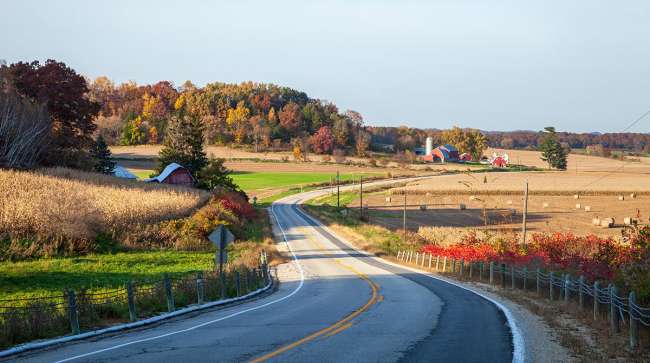Staff Reporter
Wisconsin Grants $100 Million for Ag, Forestry Road Repairs

[Stay on top of transportation news: Get TTNews in your inbox.]
Wisconsin Gov. Tony Evers has awarded $100 million to the state transportation department to spend on 55 projects repairing rural roads to better move agricultural and forestry products.
“It’s exceedingly important to have good roads and infrastructure, which not only ensure Wisconsinites can get from Point A to Point B safely but also make sure our farmers and agricultural industries can get products to market to put food on the tables of families the world over,” Evers said. “We must continue investing in repairing and fixing our roads and modernizing our infrastructure to support our farmers, agricultural industries and rural communities across our state.”
The grants, announced Feb. 5, will be distributed by the Wisconsin Department of Transportation. The funding is earmarked for projects that revamp rural roads and culverts to more safely and efficiently handle Wisconsin’s transportation of its key agricultural and forestry products across the state.
Wisconsin’s freight network includes more than 1,100 miles of the National Highway Freight Network and 143 miles of critical rural freight corridors. The rural freight network is on public roads that connect to primary freight highways, interstates, ports and intermodal freight facilities.

Evers
Rural roads serve as Wisconsin’s “first- and last-mile links in the state’s farm-to-market commerce,” according to the 2023 Wisconsin State Freight Plan. The plan highlighted “an area of concern” in local bridges with weight restrictions on secondary roads.
“In 2022, 504 local bridges were posted (load restricted) because of condition and/or obsolescence. In many cases, heavy vehicles (mining, agricultural, energy cargo or equipment, and some timber-related vehicles) are not designed to meet the local road and bridge size and weight requirements found in Wisconsin statutes,” the freight plan states.
The new grants will improve rural infrastructure in 36 counties using 2023-25 biennial budget funds (totaling $150 million) from the Agricultural Roads Improvement Program. The ARIP was created in the state Legislature through the enactment of the “2023 Wisconsin Act 13.”
2023 Final Freight Plan_Publication
“Contributing a combined $116.3 billion in economic impact and supporting nearly 354,000 jobs across the state, Wisconsin’s agriculture and food processing sectors are a critical part of our state’s history and our future,” Evers said.
Rural roads form primary transportation networks for Wisconsin’s haulers, processors and distributors that move goods such as ethanol, dairy products, animals, grain/feed, manure/fertilizer, potatoes, other vegetables and cranberries. The grants are the second release of funds under the ARIP.
INVESTING IN LOCAL INFRASTRUCTURE: WisDOT and @GovEvers today announced an investment of $100 million for 55 projects to assist with fixing and upgrading aging local roads that support Wisconsin’s farmers and producers. https://t.co/7WRNaU8vWS pic.twitter.com/AlYI10Zofz — Wisconsin DOT (@WisconsinDOT) February 5, 2025
Last July, the first batch of ARIP grants totaling $50 million was awarded to 37 rural infrastructure projects in 28 counties. Eligible projects must meet several conditions. Infrastructure must be on a local rural highway, bridge or culvert used by at least one agriculture producer to access land or facilities used in agriculture or forestry. The program covers 90% of eligible project costs and requires a local sponsor/rural public government to pay for the remaining 10%.
Host Seth Clevenger and TT's Connor Wolf discuss CES 2025 and the emerging technologies that could push the trucking industry forward. Tune in above or by going to RoadSigns.ttnews.com.
“ARIP is designed to improve already existing weight-restricted or Class B roadways or bridges or culverts on weight restricted or Class B roadways used by agricultural or forestry producers such that they are no longer weight restricted. Construction of new roadways, bridges, or culverts are not eligible,” according to WisDOT.
Strong demand for the funding is evidenced by the number of applications submitted in both grant solicitations.
“WisDOT received 299 unique ARIP applications, reflecting $507 million in project costs, highlighting the increased statewide demand and interest in the program,” the governor’s office stated.
The lowest ARIP grant ($188,555) was awarded to the village of Endeavor, which has under 500 residents in Marquette County in an Amish area. The largest ARIP grant of $4.8 million will repair County Trunk Highway in Juneau County.
Want more news? Listen to today's daily briefing below or go here for more info:





